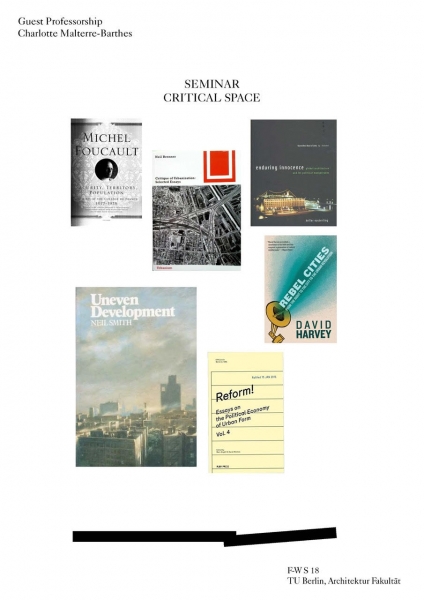Research & Teaching
Theory Seminar: Critical Space
“The ability to think critically involves three things: (1) an attitude of being disposed to consider in a thoughtful way the problems and subjects that come within the range of one’s experiences, (2) knowledge of the methods of logical inquiry and reasoning, and (3) some skill in applying those methods. Critical thinking calls for a persistent effort to examine any belief or supposed form of knowledge in the light of the evidence that supports it and the further conclusions to which it tends. It also generally requires ability to recognize problems, to find workable means for meeting those problems, to gather and marshal pertinent information, to recognize unstated assumptions and values, to comprehend and use language with accuracy, clarity, and discrimination, to interpret data, to appraise evidence and evaluate arguments, to recognize the existence (or non-existence) of logical relationships between propositions, to draw warranted conclusions and generalizations, to put to test the conclusions and generalizations at which one arrives, to reconstruct one’s patterns of beliefs on the basis of wider experience, and to render accurate judgments about specific things and qualities in everyday life.” Edward M. Glaser, An Experiment in the Development of Critical Thinking, Teacher’s College, Columbia University, 1941.
This reading seminar on critical space aims at enhancing our capacity to reflect on architecture and spatial conditions. Through various writings from thinkers relevant to the built environment, the seminar help us to familiarize with methods to organize, clarify, formulate, question, and discuss our process of thinking in relation to the built environment, and to reflect critically on the production of space.
2018-2019, Guest Professorship Charlotte Malterre-Barthes. Teaching Assistants: Wassily Walter, Cecilia Santamaria, Nicolas König
- More Critical Thinking Seminars
- Homes on Fields
- Mapping the Political Economy of Space
- Material World
- Beyond Technofix
- MUCEM
